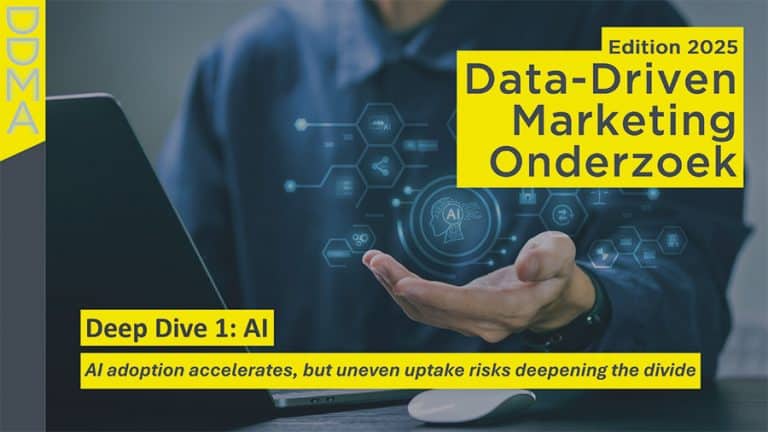Also available in Dutch
DDMA Barometer 2023 English
Download (1,42 MB)DDMA Barometer 2023 English Infographic
Download (55,51 KB)Figures reveal that the application of AI and automation is considered to be the least important for the future of the marketing profession, compared to other major trends such as sustainability, diversity and inclusivity, and the adequate upkeep of knowledge and skills, and innovation. It appears that its actual implementation is not a matter of course and rather isolated. Only 14% of organisations actively address this topic within their organisation, but not within their marketing teams. Within 24% of organisations, this topic is exclusively active within the marketing teams. In 25% of organisations, it is relevant to both aspects of the organisation. Remarkably, AI plays no role whatsoever in 26% of organisations. In other words, both organisations and their marketing teams are not yet at the stage where they are making full use of this technology.
Moreover, expectations regarding the impact of AI on the professional realm of marketers are also not all that high, with only 41% convinced that applications such as ChatGPT or other AI tools will lead to the disappearance of marketing jobs and expertise. However, we do see a lot of division in this regard. For example, the B2B segment estimates that the impact of AI on jobs and expertise will be higher (42%) than the B2C segment. The size of an organisation is also a factor. Only 30% of small organisations (1-10 employees) are anticipating that there will be an impact, compared to 43% for SMEs (11-500 employees) and 45% for larger-scale organisations (500+ employees).
It is worth noting that the members of the DDMA do foresee a major role for AI and automation in the future of the marketing profession: 82% of them expect this topic to become more important, compared to 46% of the Dutch sector representation. Nevertheless, this group is also not yet fully utilising the technology within the organisation; here no significant differences are discernible compared to the sector representation.
Marketing teams aware of the importance of sustainability, but remain reluctant
The marketing sector sees sustainability as an important future topic within the marketing profession: A total of 65% of respondents consider sustainability to be a crucial marketing topic for the coming years. Despite this, marketers are still not awarding it very much attention. 40% of organisations are engaged in sustainable activities throughout their firm. It is striking that, in the remaining organisations, sustainability is more of a factor compared to the other matters within an organisation, but not within the marketing teams, despite the great importance attached to it. The discrepancy between the recognition of importance and actually taking action may arise from the fact that people often do not know how to get started. Only 19% can cite examples of how they might be able to make marketing activities more sustainable.
The major challenge: keeping up with knowledge and skills
A definite factor in terms of this reluctance, is that many organisations experience difficulties in maintaining the required employee knowledge and skill sets. Figures show that agility and adaptability are crucial in this regard, but often pose a huge challenge. The developments in this field are progressing so quickly, that marketing learning programs cannot remain the same for long. Many organisations do pay attention to this aspect. For example, 47% of the respondents have sufficient knowledge and skills within their entire organisation, including within marketing teams. Moreover, 66% of organisations work according to agile or fully agile principles. It is especially difficult for large organisations to respond quickly to changes. This is easier for SMEs because they are smaller and more flexible. Here, however, other factors, such as budgets, generate new challenges.
Marketers see few fundamental changes within the profession
Despite current rapid developments, only 22% of organisations expect marketing-related jobs to change in the future. Those employment positions that they believe will become more important in the future include the AI specialist, data analyst, digital marketing specialist, and jobs related to social responsibility. This ultimately comes at the expense of more traditional marketing jobs, focused towards print and offline marketing, but also the profession of copywriter and content specialist. Large organisations (500+ employees) are anticipating more changes in this regard. A total of 41% expect the importance of jobs to shift, compared to 17% of small and SME organisations (1-500 employees).

Ook interessant

DDMO 2025: AI adoption accelerates, but uneven uptake risks deepening the divide

5 ways to navigate the Waves of Personalization



